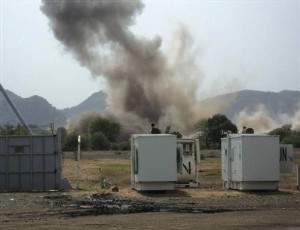Sudanese gather in New York to urge the UN to stop ‘ethnic cleansing’ in S. Kordofan
By Gisela Perez-Mauri
August 8, 2011 (NEW YORK) — About one hundred Sudanese and South Sudanese citizens gathered outside the United Nations on Friday to push the international community to take action on ongoing killings and bombings in Sudan’s South Kordofan, a state bordering South Sudan, after reports of heavy fighting in June and satellite images of alleged mass graves last month.

Basha, who came to the United States as a refugee seven years ago, lost his mother in the June bombings, just one week after he left his homeland after a ten-day visit. Since then, he has not heard about his father, who he thinks disappeared during the fighting in the region.
A recent UN report referred to summary executions, aerial bombardments and shelling of neighborhoods by both pro-southern rebel groups and the Sudanese Armed Forces (SAF), but qualifying SAF actions as “especially egregious”. The UN has warned about possible war crimes and crimes against humanity.
Hikma Koko, 18, is a refugee from the Nuba Mountains who came to the United States with his mother, father and siblings in 2000. Most of Koko’s family still lives in the hard-hit region. She thinks that Omer Al-Bashir, the Sudanese President who has expressed his intention to create an Islamic state, is carrying out “ethnic cleansing” in this mainly pro-South, non-Muslim region.
“The situation is getting worse everyday, people don’t have jobs and they are segregated in their own country. It’s like they were second class citizens,” said Koko quoting members of her family in the Nuba Mountains.
Demonstrators carrying signs of “end genocide, save lives”, “stop killing the Nuba children” or “racist regime in Sudan must go,” were screaming “Al-Bashir to ICC” –recalling that the International Criminal Court issued an arrest warrant to the Sudanese President for alleged genocide and crimes against humanity during the separate conflict in Darfur.
While Sudanese activists were rallying outside the UN, Reverend Andudu Adam Elnail, an Anglican Bishop of South Kordofan, met Security Council members to urge them to stop what he also defines as “ethnic cleansing”.
“We need the Security Council to push the Khartoum Government to sit with the two parties and agree to a ceasefire. We need peace in Sudan,” he said. “Then, people will be able to eat and talk,” said Elnail, in reference to recent reports of expulsion of humanitarian aid agencies from South Kordofan.
Peggy Hicks, Global Advocacy Director at Human Rights Watch, who also spoke to the press, emphasized that it is difficult to get a sense of the “horrendous abuses” that are going on in South Kordofan because of the lack of international media and humanitarian staff in the region. However, she said that it is “cynical that the lack of information means that there needs to be inaction by the UN” in the area.
“If the Security Council wants more information on what’s going on, they are responsible for ensuring access to South Kordofan,” she said forcefully.
Hicks alerted about the need to end what some UN staff members and reporters may know as “Sudan fatigue”, since ethnic and religious tensions in the African country have long been in the Security Council agenda.
“What message do we send to human rights perpetrators? Keep up!,” she said angrily. “Fatigue does not apply to address mass atrocities in South Kordofan,” she said, after reminding that some 200,000 people are thought to have fled the area since the aerial bombardments, artillery shelling and extra-judicial killings began in June.
(ST)
